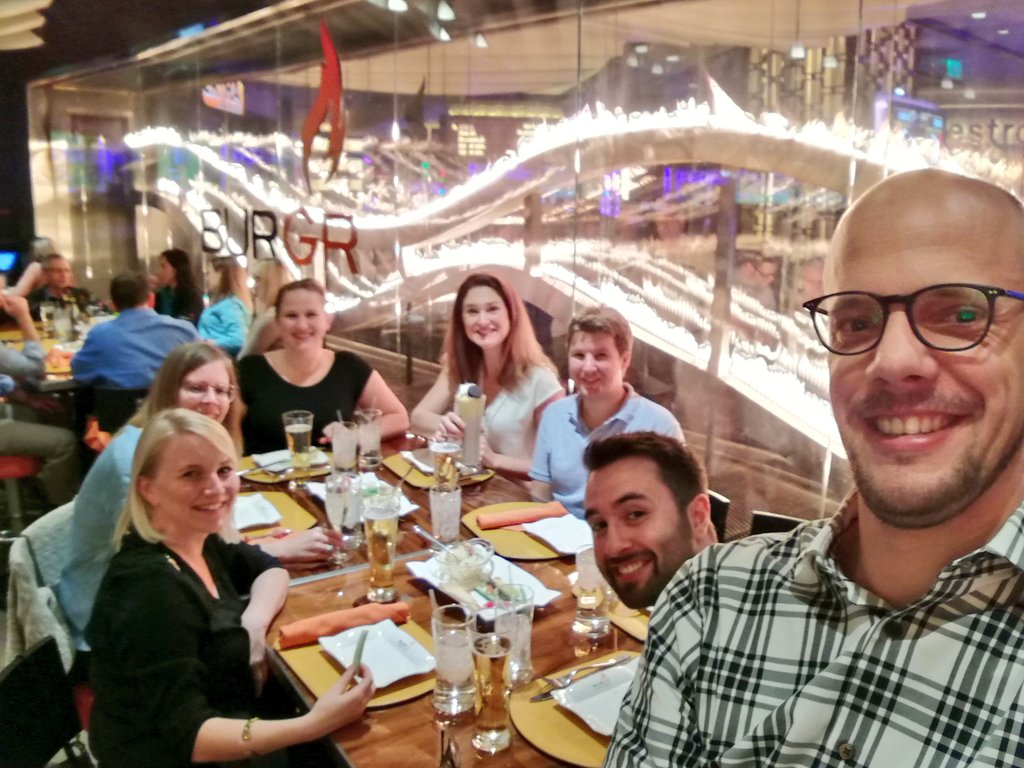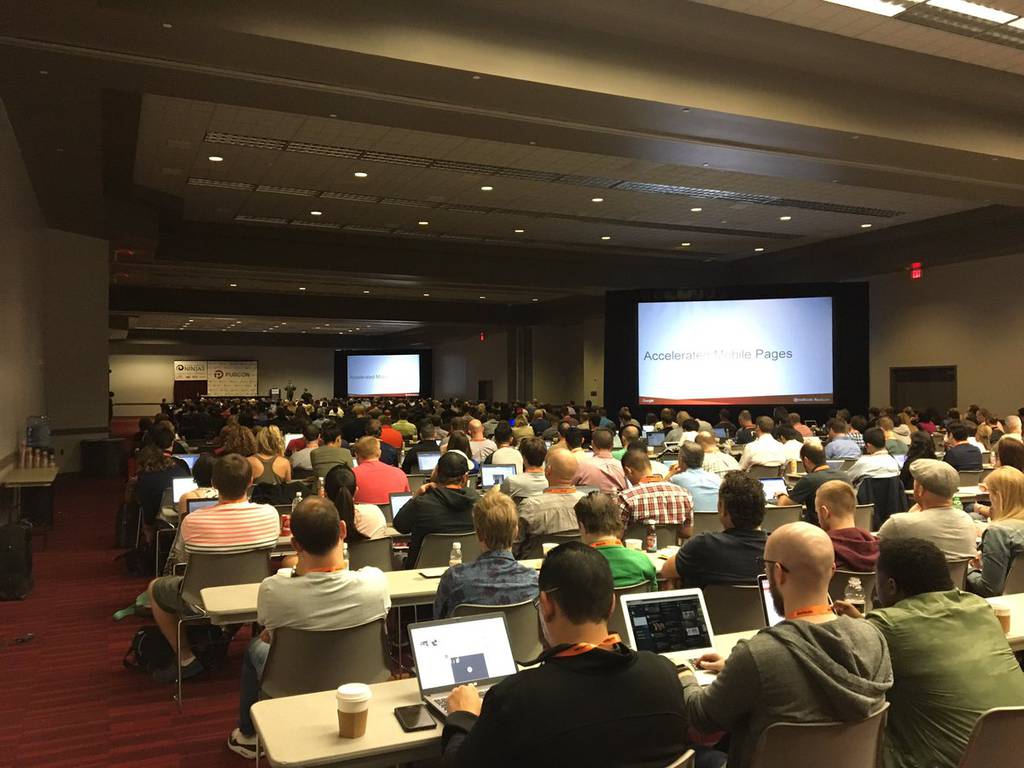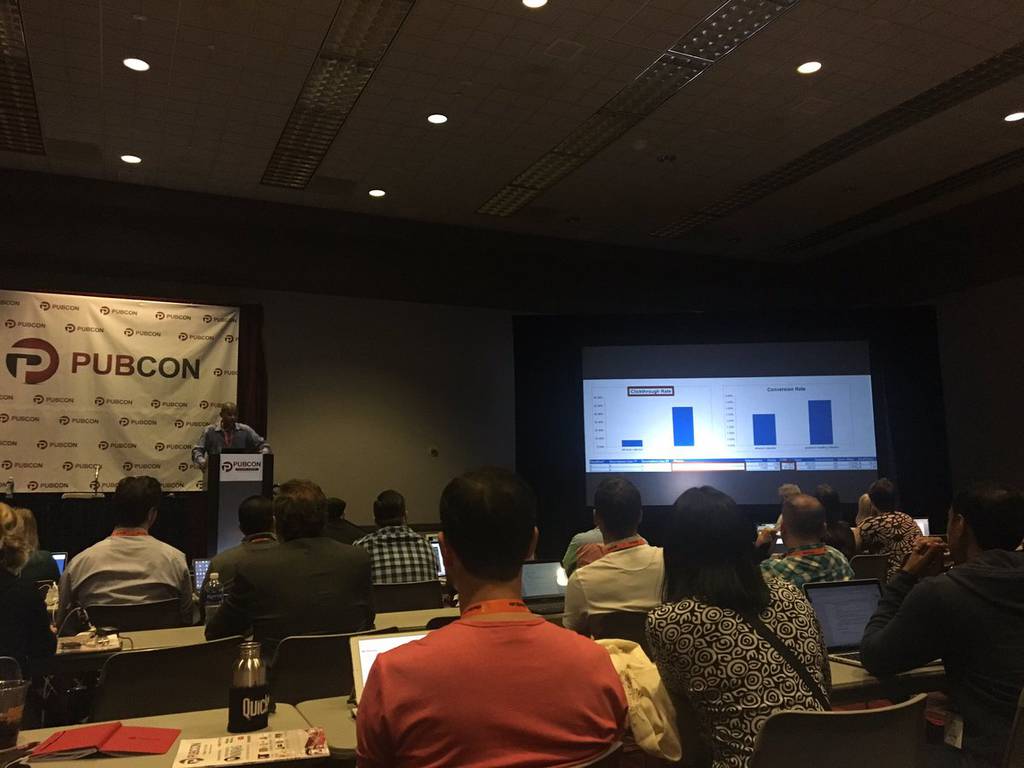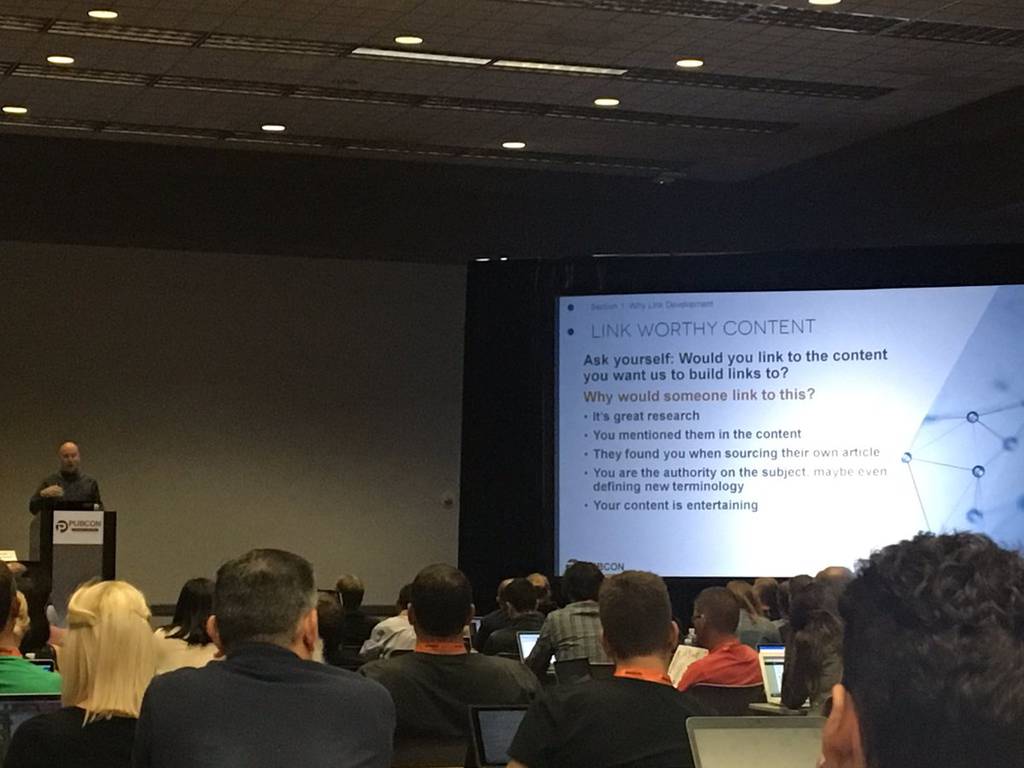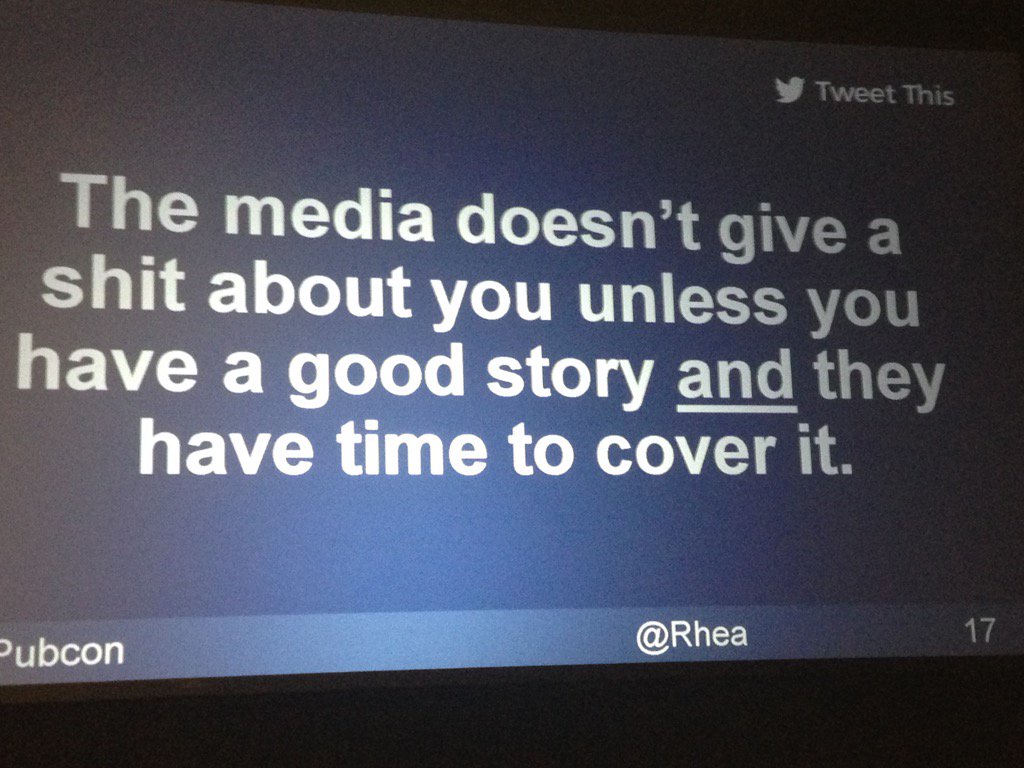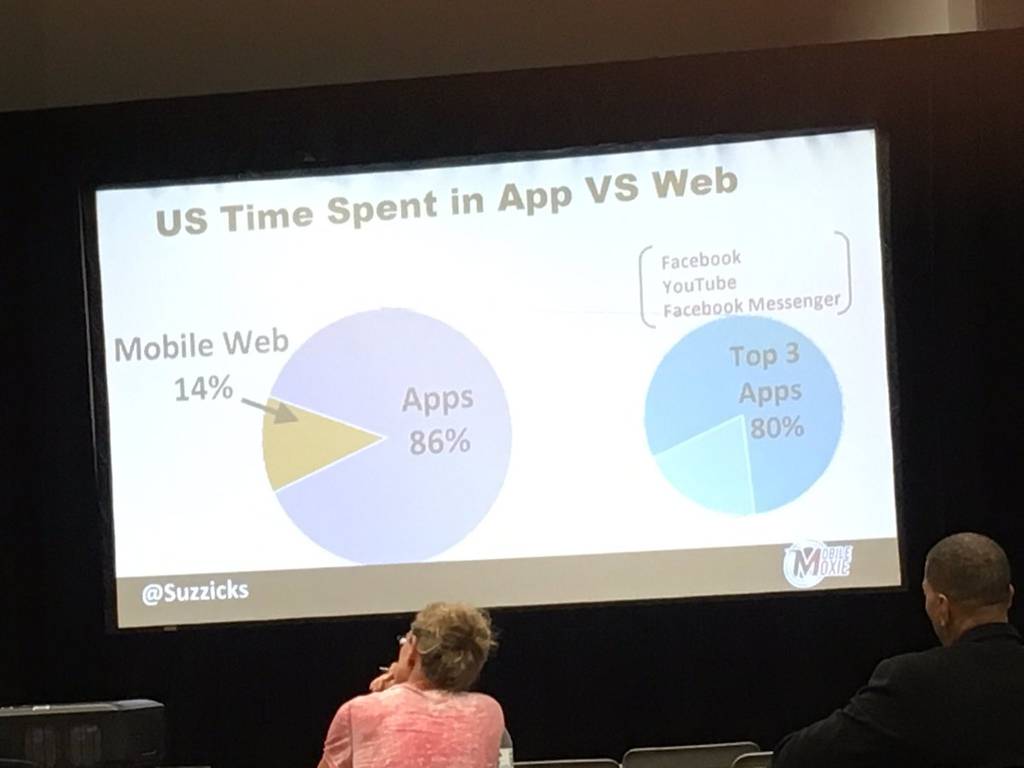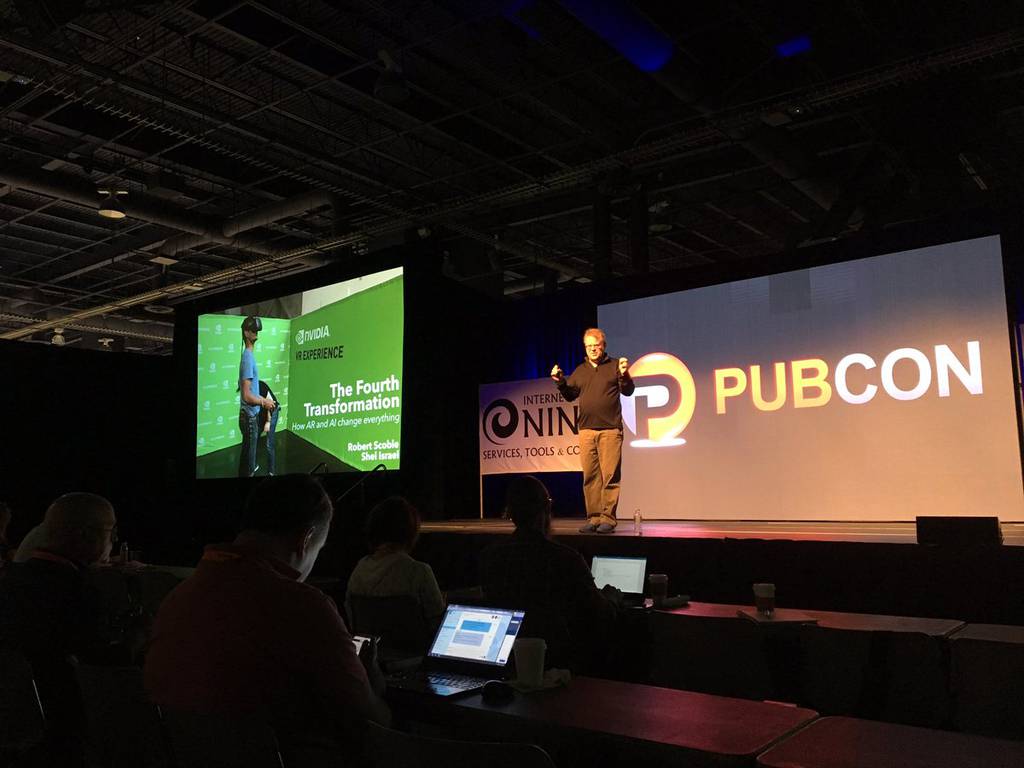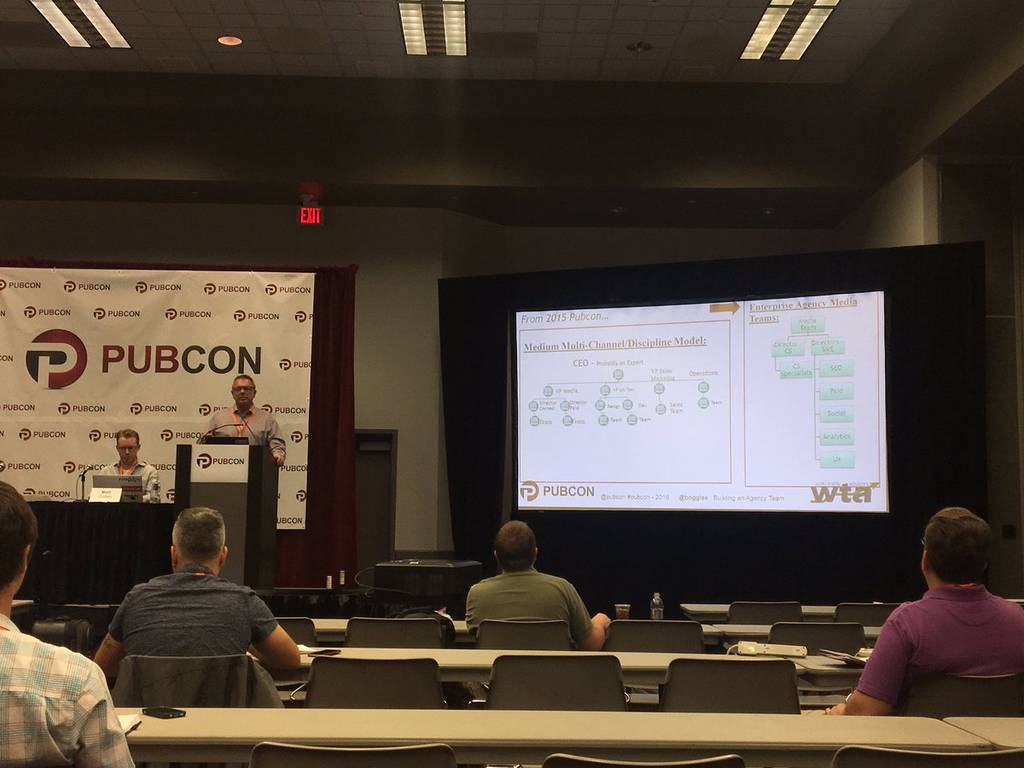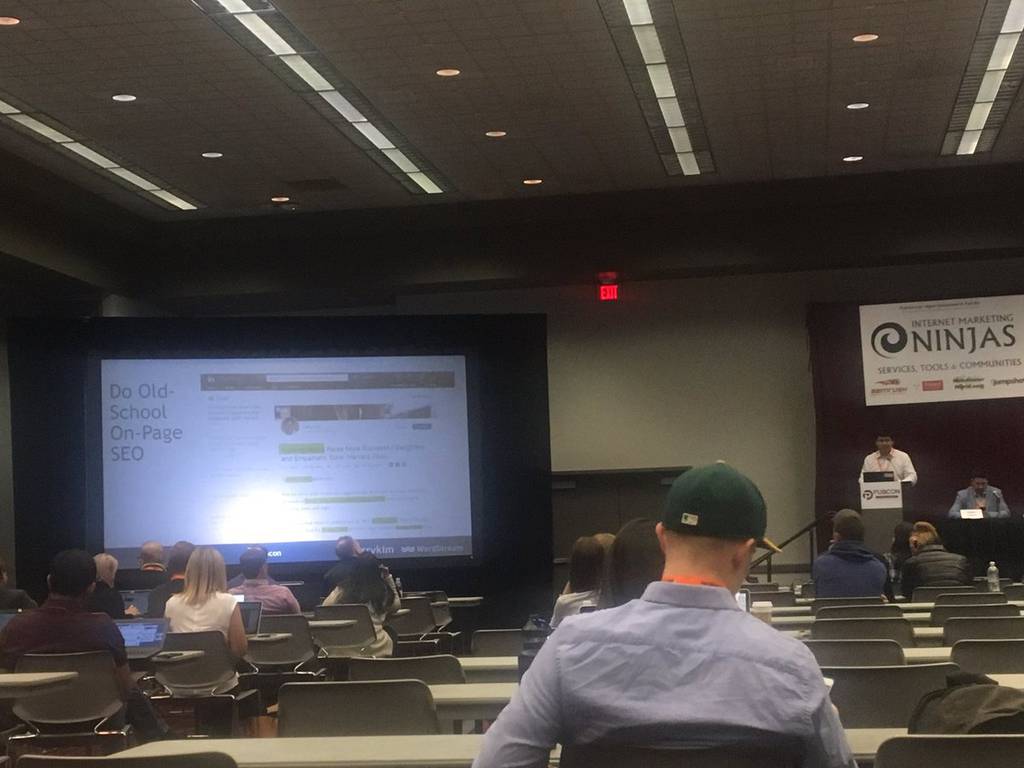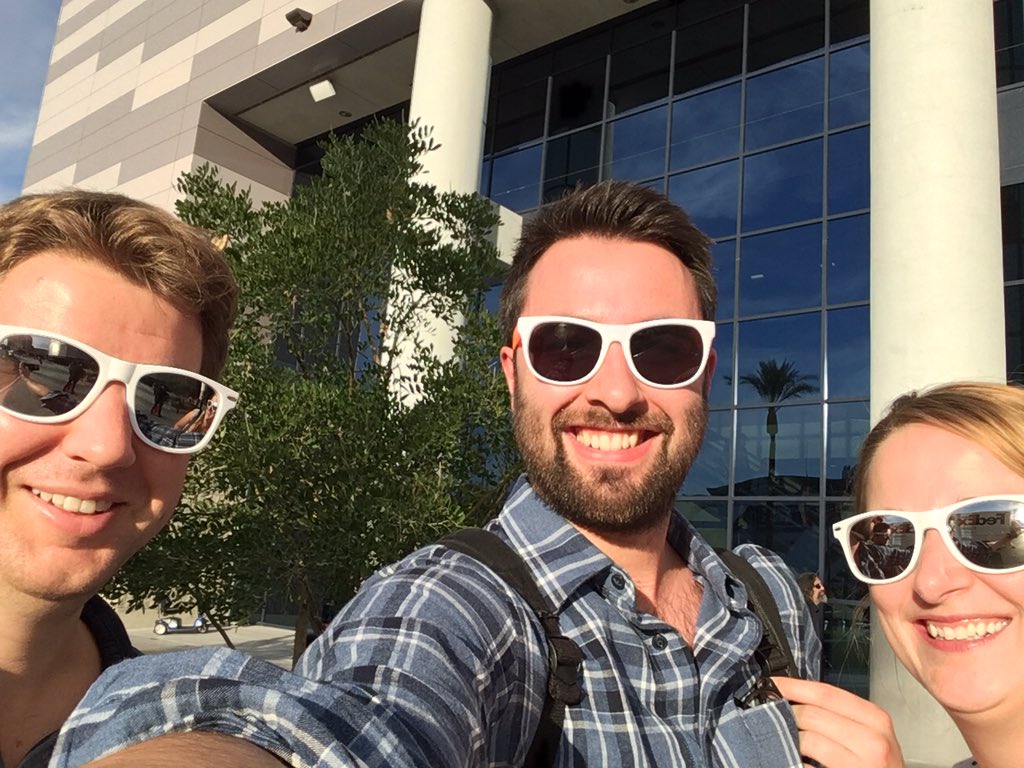Last week, Chelsea, Irma, Sam, Raphael, Nicole, Marion and I, headed to Las Vegas for Pubcon:
We’re always keen to keep ahead of the game, and I’ve always found US conferences a really useful way of keeping up-to-date with all things SEO and content marketing. For this reason, it was great to be able to go back to Pubcon with a bigger team, as it’s hugely important for our team to keep learning, innovating, networking and improving…
During the 3-day event, we’ve listed a recap of the key points we learned together across the team:
Google:
- The big update was Gary Illyes’ announcement that Google is switching to a mobile first index. This is big news as previously Google’s index was desktop only, rather than splitting into mobile and desktop. “If the content on your mobile page is the same as desktop, those sites will be fine” – however, reading between the lines that indicates that if your mobile page isn’t the same as desktop, you could suffer from this. I would also see this as another reason for pushing towards a single responsive website, which is accessible across all platforms and devices. As opposed to using “m.” subdomains – this consolidates link equity, without the need of redirects or canonical tags which helps to lessen the crawl budget used on your site.
- Everyone should use HTTPS – Gary Illyes pulled no punches on this one, saying that it makes sense for every site to use HTTPS. “He gets weird ads because he’s in Vegas and he’s weird but that’s another thing. If your site is on HTTPS, weird ads can’t be injected.” It’s no longer a case of “if” you should move to HTTPS, I’m not sure it’s even “when”, it’s “now”. SearchMetrics have also said this week that their data shows a YoY +31% uplift in organic visibility for sites with HTTPs over HTTP. If you’re thinking of moving to HTTPS, you should read this excellent guide with everything you need to know from Fili Wiese.
- Removing your disavow file may be a good idea, (or not)… There were a few recommendations that it’s now time to drop the disavow file. Whilst there were other comments that this idea is crazy. Honestly, I’m not sure what side I’m on for this argument, so I decided to test what happens if you remove your disavow file?! Full update coming later in the week…
- If penguin sees signs of manipulation, they can algorithmically decide to discount all links – this is something we suspect they have done for a long term, although I haven’t heard this directly from Google before – so it’s interesting to confirm. Gary Illyes also stated that he has seen no signs of negative SEO working, and that in some cases it actually helps more than it hinders…
- RankBrain doesn’t change much – it’s a very complicated algorithm, but mainly affects long-tail and negative queries so far. Other people said it will have a big impact in the future, but it’s more about how Google thinks about queries, rather than it being a direct ranking factor itself.
- Links are still key in competitive verticals – the quote being that “Ranking without links is really hard. Not impossible but very hard”
- Google are working on providing more historical data in Search Console – this was very well received and although the date-range isn’t confirmed, it was rumoured to 12 months worth of data – which is a big improvement over the current 90 days.
- CTR isn’t a direct ranking factor but serves to check the other ranking factors to make sure they put out good results – suggests Gary Illyes.
- Google uses comments as a measure of user engagement – this recommendation makes perfect sense to me and is something I wrote about myself back in 2013.
- Google shopping result grew +275% in the last 18 months – according to Navah Fuchs.
SEO:
- Optimise for 2017 keywords now – people will be thinking ahead, but the competition is low. This is a tip that I’ve used for a long-time and it always works well. It’s also effective for increasing CTR. The last thing you want is an outdated headline/title tag that is going to put someone off of clicking your listing.
- Google Answer boxes is a great way to generate additional traffic – Rather than aiming for number one organically, you can optimise for “position zero” and leapfrog the results with Answer boxes – we’ve seen some great results with this and it’s something I’d highly recommend investing some time into.
- SEO reporting is all about showing the money – as Ant Robinson demonstrated in his excellent presentation. He also highly recommended watching Rand Fishkin’s whiteboard Friday on tying marketing metrics to what the board values.
- Focus on quality, over quantity – Traffic x Conversion Rate x Conversion Value = how your site makes money – this is a simple, but effective rule from Theresa Baiocco to make sure you’re driving the type of organic traffic that really matters.
- SEO myth: ‘There’s a duplicate content penalty‘ – this one always annoys me when people talk about duplicate content penalties. As Dawn Anderson says, this doesn’t exist and Google have a ‘dupe’ server patent to confirm. I could go into this in more detail, but that would be a post in itself, will leave for another day. In the meantime, here’s a fantastic resource from Shaun Anderson and there’s no-one better to read about Google patents than Bill Slawski.
- Page speed is important for SEO, we know… But “the real reason to make your site faster is business. Money.” says Fili Wiese. Couldn’t agree more – he’s a Wiese man! Also, check out Ian Portent’s extremely detailed presentation and guide to page speed.
- Leverage PPC ad description data to increase organic CTRs – Wil Reynolds delivered an excellent presentation, in which he demonstrated a 4x uplift in traffic by doing this!
- Little or no organic visibility on page 1? Buy ads on the pages that rank – this was a smart tip from Wil again, you can even look up specific URLs in AdWords to make sure that your brand is seen on the top pages which are generating traffic for your target keywords.
- Fire your SEO agency if they are submitting you to article directories, private link networks, paid links etc. Hopefully, this one has been a given for a while now, but sometimes you’ll be surprised suggests Scott Polk.
- 89% of sites that ranked 7 years ago do not rank today – interesting stat from SearchMetrics.
- 61% growth in who, what, where, how questions – this is a big opportunity, especially if you can line this up with securing Google Answer boxes for common queries.
- Voice search has more featured snippets and longer tail queries than textual searches, according to both Jen Slegg and Purna Virji.
- Schema is really important, as higher % of searches now don’t click on any listings – suggests Purna Virji. Also Rand Fishkin’s Mozcon presentation this year shows some great data behind this.
- Build a voice search checklist – Purna Virgji suggest you should; 1) analyse search terms, 2) re-visit your match type and 3) think about ad copy.
- Big opportunity in RankBrain. What questions are people asking? Bill Hunt suggests mining your internal site search and finding out common questions which are asked in your call centre to build a list of content ideas.
- Results with featured snippets grew +64% in the last year – according to Stone Temple.
- Don’t ever canonicalize an hreflang page to a global page, recommends Bill Hunt.
- Large companies don’t do small well. If it doesn’t scale, they won’t do it – warns Duane Forrester.
- Learn AMP through sample templates at ampbyexample.com & use AMP chrome plug-in for validation – tip from Barry Adams.
- No faster way to test what makes people click, than PPC – lots of great learnings for SEO to be had from paid campaigns, shared by Wil Reynolds.
- Sort live links from dead ones using this tool – thanks to Jim Boykin for sharing.
- Google can read JavaScript redirects as long as a ‘rel-alternate’ is in place. Google has silently updated its guidelines says Cindy Krum.
- Keyword Trends: (a) ‘Near me/Nearby’ terms are up 100% YoY (b) ‘How to’ terms are up 70% YoY on YouTube, says Craig Paddock.
Content Marketing:
- Create personas for every country you market to – you need to know your audience, everyone is different and must be tailor too. Michael Bonfils nails this here.
- Track scroll depth to understand how people are engaging with your content – you can find this info in Google Analytics and view per device so that you can assess the engagement levels before you invest more heavily in the promotion. Tip from Wil Reynolds.
- Ethics is not a renewable resource. Trust and integrity are not just recharged every now and then. Scott Stratten highlighted some big content mistakes brands have made.
- Build lookalike audiences from your highly satisfied customers – Wil Reynolds suggests learning from the trends of your best customers, in order to acquire similar likeminded people to your site.
- Focus your content on pain points – Shahid Awan is absolutely right, if you know the pain points your customers typically have, that should be your starting point for creating content that addresses them.
- To have the greatest impact, be consistent and sustained – Kris Jones recommends creating thought leadership content twice per month, over 2 years to really start making an impact and name for yourself.
- Be discoverable, shareable & memorable – top personal branding content tips from Mel Carson.
- Email marketing is the most powerful thing you can do in your business – it starts the journey to rewarding your customers, suggests Duane Forrester.
- Focus on E-A-A-T in content marketing says Shahid Awan. This means; Expertise, Authority (benefits), Authority (source), Trustworthy (image here).
- When you design ebooks, always think about how you can collect leads or customer data to make it worthwhile – tip via Kelsey Jones.
- It’s not about you. It’s about your story – Rhea Drysdale saying it how it is; “the media doesn’t give a shit about you unless you have a good story and they have time to cover it”.
- Future of content: Flowing data, start stop motion, interactive video, 360 imagery, Snapchat
- Put head terms into Quora auto-suggests to find content topics and long tail keyword ideas. Tip from Martin Weinburg.
- 90% of information transmitted to the brain is visual and visuals are processed 60,000 x faster than text, says Jesse McDonald.
- Topic clustering is something no one does in the content journey but is very helpful, suggests Jordan Koene.
- It’s not about attention, it’s all about intention suggests Mike Grehan.
Digital PR:
- Don’t go after the Huffington Post. Go after the group of people that the Huffington Post gets their stories from – smarter thinking from Rhea Drysdale.
- Mine competitors links, find popular content in niche & focus on long-term relationships – solid outreach tips from Paul Madden.
- Always be earning – To earn links, your content should solve problems, educate, entertain, add value and be a resource, recommends Kris Jones.
- Ask yourself would you link to your content? Be honest with your response and make sure you have that angle and hook to get people interested, suggests Arnie Kuenn.
- Find a huge list of national and local media publishers using abyznewslinks.com – very useful find from Rob Woods.
- If you want to write for a publication, do @ twitter search, filtered by accounts, e.g.: try this search to find @huffingtonpost writers – a nice tip from Julie Ewald.
- Check your site first, find and promote stuff that is already getting links – from Marie Haynes talk.
- Before: Get links from quality pages to my website Now: become an entity and get linked in my Entity data sources – says Dixon Jones.
- Only target people with Facebook Ads that actually share links from other people – use Buzzumo to find out, Wil Reynolds suggests.
- A good link is one that drives traffic – query the Google analytics API for “full referrers” to understand valuable links actually driving traffic.
- Links from National publishers don’t move rankings as much as expected vs other sites – based on analysis from Paul Madden.
- Give targets to your outreach and link building team e.g. 1 link per 30 emails sent – recommends Arnie Kuenn.
- If you really have a story, news teams will report on it. But be quick and call them, not just email them due to deadlines, says Rhea Drysdale.
Mobile:
- Users are spending their time on apps, advertisers money goes on mobile ads – this is a trend that surely has to shift in 2017, based on this graph alone from Cindy Krum.
- Mobile Optimization is not about mobile rankings or traffic. It’s all about real customer engagement, conversions & business
- Focus on mobile because it’s your new website says Duane Forrester.
Virtual Reality:
- By the end of next year most of the world will get VR through their mobile phones, with built in headset, predicts Robert Scoble in a fascinating keynote.
- Microsoft are betting the future of the company on HoloLens – Apple, Google & Facebook similar approach with VR, says Robert Scoble
- Marketing is about to deeply change – says Sephora are already using VR to colour match makeup, Ford are test driving virtual reality and 360 video. In a few years, Robert Scoble says, every brand will have a physical component to it, and a virtual component. VR changes how you shop, work, listen to music, workout, learn & more…
- iPhone launch next Christmas is huge for VR – also it won’t be called an iPhone 8 and it’s likely to be a plain sheet of glass. The last iPhone updates have been pretty uneventful on the whole, but some of those updates are gearing up to this, which will be massive. This is well worth a read for more info on what they have planned.
Agency:
- “Whoever pays the bill should define the communication channel” – I really like this rule from Scott Stratten to make sure that communications are client-centric and not to just push people down the channels we prefer (for instance, email the car dealer rather than call them if the customer wants to buy over email).
- It’s much easier to forecast PPC results vs spend than it is for SEO projections says Chris Boggs.
- Build an agency dream based around common skill-sets – highlighted here from Chris Boggs’ presentation – I have slightly different views on this, as I discussed with Chris afterwards, but the concept is spot on, with a mix of different skills to do what’s right for your clients and agency team setup.
Social Media:
- Find popular content on LinkedIn – using this link & change term in URL: https://linkedin.com/topic/content-marketing great tip by Sean Jackson. You can also do a similar search in Quora.
- If you have a verified Twitter account, new followers will automatically follow you on Vine, Periscope & Medium too – I hadn’t realised this, but having a Twitter verified account for the last couple of months, I have noticed an influx of new followers on my Medium.com profile which now explains it! Thanks Julie Ewald for the tip.
- Get your team to view your profile & all competitors – you’ll get onto their “people also viewed” list is a somewhat sneaky, but effective tip from @jabezlebret.
- Microsoft are buying LinkedIn for data grab – expect to see integrations into Office Suite, e.g. Shared Outlook and LinkedIn contacts.
- LinkedIn showcase pages are the biggest way to build your company profile to show products/services, suggests @jabezlebret.
- LinkedIn groups kind of suck now – I would agree with this comment from @jabezlebret, it’s very hard work to keep active in engagement and free from spam now.
- LinkedIn ad CPCs are high, so be direct in selling – if they click, you want buying intent to be high suggests Larry Kim.
- Use LinkedIn more like Twitter – Larry Kim says he shares content 1-3x a day and connects with people you want to know but haven’t met.
- Do old school SEO on LinkedIn pulse posts, optimising headlines & text vs topic categories so that you can become a featured article, says Larry Kim.
- Competition on snapchat is notably cheaper than FB/Twitter/Instagram – big opportunity to reach target customers cheaper.
- Get connected with the people you want to target with ads on LinkedIn export the contacts and create a custom audience.
- Reddit hack put /about/traffic at the end of a post to see analytics – see screenshot here.
What else did we learn?
Sadly, we found out that none of us are good gamblers. As with SEO, you have to limit the downside and maximise the upside… Our overall winnings across the week would look pretty dismal (and negative) as a ROI report!
It was great to enjoy the US Search Awards, having been a judge for the event this year:
We learned that Vegas is great fun! And Chelsea doesn’t like rollercoasters… Or Jägerbombs (I haven’t posted the photos for this… yet!).
Overall, a great trip and hopefully we’ll see you at Pubcon 2017 🙂


